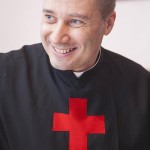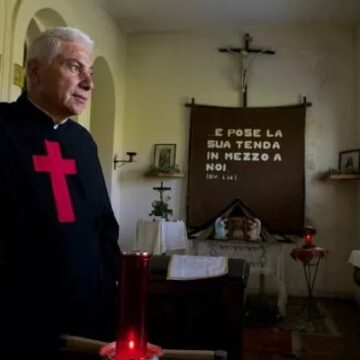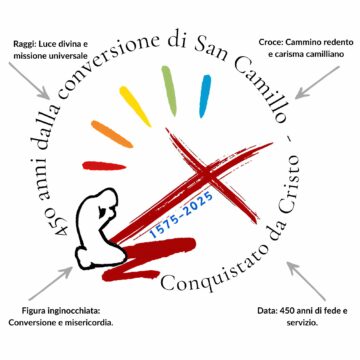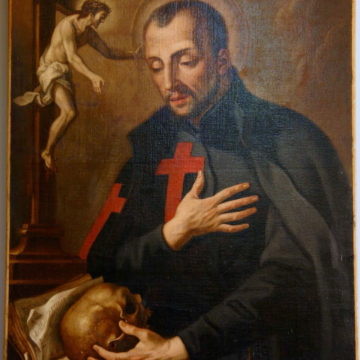NEWSLETTER N. 18 November 2015 – PDF
‘Merciful like the Father’ Pastoral Care in Health during the Jubilee Year of Mercy
Comment on the Message of the Holy Father Francis for the twenty-fourth World Day of the Sick 2016
Entrusting oneself to the Merciful Jesus like Mary:
“Do whatever he tells you’ (Jn 2:5)
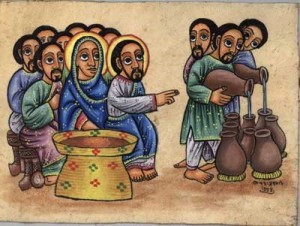 ‘The wedding feast of Cana is an image of the Church: at the centre there is Jesus who in his mercy performs a sign; around him are the disciples, the first fruits of the new community; and beside Jesus and the disciples there is Mary, the provident and prayerful Mother. Mary partakes of the joy of ordinary people and helps it to increase; she intercedes with her Son on behalf of the spouses and all the invited guests. Nor does Jesus refuse the request of his Mother. How much hope there is in that event for all of us! We have a Mother with benevolent and watchful eyes, like her son; a heart that is maternal and full of mercy, like him; hands that want to help, like the hands of Jesus who broke bread for those who were hungry, touched the sick and healed them. All this fills us with trust and opens our hearts to the grace and mercy of Christ’.
‘The wedding feast of Cana is an image of the Church: at the centre there is Jesus who in his mercy performs a sign; around him are the disciples, the first fruits of the new community; and beside Jesus and the disciples there is Mary, the provident and prayerful Mother. Mary partakes of the joy of ordinary people and helps it to increase; she intercedes with her Son on behalf of the spouses and all the invited guests. Nor does Jesus refuse the request of his Mother. How much hope there is in that event for all of us! We have a Mother with benevolent and watchful eyes, like her son; a heart that is maternal and full of mercy, like him; hands that want to help, like the hands of Jesus who broke bread for those who were hungry, touched the sick and healed them. All this fills us with trust and opens our hearts to the grace and mercy of Christ’.
These words written by Francis in his Message for the twenty-fourth World Day of the Sick, which will be celebrated in Nazareth on 11 February, the liturgical memory of the Blessed Virgin Mary of Lourdes, are a caress for all the sick people of the world. In Nazareth the ‘Word was made flesh and came to live amongst us’ and it was there that Jesus began his mission of salvation.
With the approach of the Jubilee Year of Mercy, to read and reflect upon the Message of Pope Francis for the twenty-fourth World Day of the Sick (11 February 2016) and to examine his magisterium (words, gestures, signs, embraces …) not so much on illness understood at a theoretical level, but, rather, at the level of his approach (gestures, signs, embraces, the meeting of hands and arms and looks and smiles and tears…) to/for sick people, is a little like beholding the image of the silent poor Christ of The Legend of the Great Inquisitor by Dostoevsky.
The Christ who keeps silent makes of his own silence a remedy for the empty words – in an idolatrous sense – of the Great Inquisitor, contesting his pseudo-truth and at the same time opening up the possibility of different words that almost come from the most set aside extremity of silence.
In this, he revealed the very essence of the presence of God in history. The silence of Christ culminates in a gesture of giving, a kiss, which will always burn the Inquisitor, which will burn more than any word, and which is the definitive way by which Christ will be with him, in the desert of loneliness as well.
This gesture explains why it is possible that from frailty, from suffering and from silence is born a word that really becomes com-passion and witness to nearness that opens up in this context to hope (cf. Benedict XVI, Spe Salvi = pain is a setting for the exercise of hope and learning about it).
Faithful to our gospel origins, we Christians must be those people who unite the mandate of Jesus, ‘heal and proclaim’, in a single project. I would go further: heal proclaiming and proclaim healing (and curing). This dual dimension of our vocation to the humanum requires at one and the same time the coherence of witness and the impetus and the spirit of the ‘Pastor’.
The deeds of Christ for the sick were technical-secular-human deeds. To evangelise means, therefore, to learn the pedagogy of the deeds of Jesus. This is the shared basis of our working as believers and non-believers together in an increasing progression: to be involved in the exercise of humanity, which in itself does not need faith; to go down (kenosi) to meet men and women on their professional terrain, which is deeply marked by ‘secular’ deeds; the exercise of humanity that becomes ministry: that is to say we are invited ‘to sing the songs of Zion in a foreign land’, in a context that is not in an immediate sense most consonant with our environment; an injection of spirituality to avoid our cooperation becoming only pure pragmatism, an exaggerated sense of efficiency; well done but without a soul: the need for a shared mysticism.
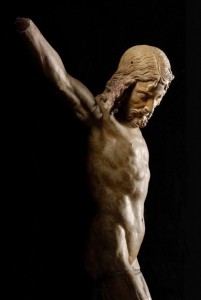 ‘Why has this happened to me?’: the Message of Pope Francis for the World Day of the Sick answers this question which illness, ‘especially when grave’, provokes in the hearts of those who suffer. A question that ‘goes deep’ when a human existence enters ‘into crisis’ and rebels. It can then be easy to fall into ‘the temptation of hopelessness’ and ‘think that everything is lost’, but it is specifically during these moments that ‘faith in God reveals all of its positive potentiality’. Faith, indeed, the Pope explains, does not make illness or pain go away but offers a key by which one can discover ‘the deepest meaning of what is experienced’. And this key, the Supreme Pontiff goes on, is given to us by Mary, the Mother of God’, an ‘expert on the way’ by which to draw closer to Jesus.
‘Why has this happened to me?’: the Message of Pope Francis for the World Day of the Sick answers this question which illness, ‘especially when grave’, provokes in the hearts of those who suffer. A question that ‘goes deep’ when a human existence enters ‘into crisis’ and rebels. It can then be easy to fall into ‘the temptation of hopelessness’ and ‘think that everything is lost’, but it is specifically during these moments that ‘faith in God reveals all of its positive potentiality’. Faith, indeed, the Pope explains, does not make illness or pain go away but offers a key by which one can discover ‘the deepest meaning of what is experienced’. And this key, the Supreme Pontiff goes on, is given to us by Mary, the Mother of God’, an ‘expert on the way’ by which to draw closer to Jesus.
‘Dear young men and women, our world today needs weeping! The marginalized weep, those who are neglected weep, the scorned weep, but those of us who have relatively comfortable life, we don’t know how to weep. Certain realities of life are seen only with eyes that are cleansed by tears. I ask each one of you to ask: Can I weep?… In the Gospel, Jesus wept. He wept for his dead friend. He wept in his heart for the family which lost its daughter. He wept in his heart when he saw the poor widowed mother who was burying her son. He was moved and he wept in his heart when he saw the crowds like sheep without a shepherd. If you don’t learn how to weep, you are not a good Christian. And this is a challenge. Jun Chura and his friend who spoke today posed this challenge. When they ask us: Why do children suffer? Why does this or that tragedy occur in life?, let us respond either by silence or with a word born of tears. Be brave. Don’t be afraid to cry!’ (Pope Francis in Sri Lanka and the Philippines, 12-19 January 2015, meeting with young people).
Caring for the sick with the eyes of love, reflecting the tenderness of God
Then Pope Francis dwells upon the gospel account of the Cana wedding feast, and defines it as an ‘image of the Church’ with at its centre the merciful Jesus who is surrounded by disciples and by Mary who is ‘provident and prayerful’, a ‘comforted Mother who comforts her children’, a ‘caring woman’ with benevolent and watchful eyes and ‘a heart that is maternal and full of mercy’. In Mary’s concern ‘we see reflected the tenderness of God’, the same tenderness that is found in so many people who look after the sick and ‘understand their needs, even the most imperceptible ones, because they look upon them with eyes full of love’.
‘Among the victims of this throw-away culture, I would like to remember here in particular the elderly, so many of whom have been welcomed in this home; the elderly are the memory and the wisdom of peoples. Their longevity is not always seen as a gift of God, but at times as a difficult burden to bear, especially when their health is seriously compromised. This mindset does not do society any good, and it is our task to develop an “antidote” to this way of considering the elderly, or people with disabilities, almost as if they were lives no longer worth living. This is a sin, it is a grave social sin. Instead with such tenderness Cottolengo loved these people! Here we can learn another way of looking at life and at the human person!… Dear sick friends, you are precious members of the Church, you are the flesh of Christ Crucified whom we have the honour to touch and serve with love. With the grace of Jesus you are able to be witnesses and apostles of the divine mercy which saves the world. Looking to Christ Crucified, filled with love for us, and also with the help of those who take care of you, you find the strength and consolation to carry your cross each day’ (Pope Francis in Turin – meeting with the sick and the disabled– Cottolengo Church – 21 June 2015).
Prayer for those who suffer: health and peace of heart
 And here the Pope remembers mothers at the bedsides of their sick children, children who care for their elderly relatives, and grandchildren who remain at the sides of their grandparents: all of them entrust themselves to the hands of Our Lady. What, then, should be asked for our loved ones who suffer? Health, certainly, writes Pope Francis, because Jesus himself manifested the Kingdom of God through healings. But there is ‘something greater’: ‘we ask for a peace, a serenity of life which comes from the heart and is a gift of God’.
And here the Pope remembers mothers at the bedsides of their sick children, children who care for their elderly relatives, and grandchildren who remain at the sides of their grandparents: all of them entrust themselves to the hands of Our Lady. What, then, should be asked for our loved ones who suffer? Health, certainly, writes Pope Francis, because Jesus himself manifested the Kingdom of God through healings. But there is ‘something greater’: ‘we ask for a peace, a serenity of life which comes from the heart and is a gift of God’.
‘We continue the catecheses on the family, and in this catechesis I would like to touch upon a condition common to all families, namely, illness. It is an experience of our own fragility, which we experience most of all at home, beginning in childhood, and then especially in the aches and pains of old age. Within the realm of family bonds, the illness of our loved ones is endured with an “excess” of suffering and anguish. It is love that makes us feel this “excess”. So often for a father or a mother, it is more difficult to bear a son or daughter’s the pain than one’s own. The family, we can say, has always been the nearest “hospital”. Still today, in so many parts of the world, a hospital is for the privileged few, and is often far away. It is the mother, the father, brothers, sisters and grandparents who guarantee care and help one to heal… The Gospel scene just referenced from the Gospel according to Mark is truly moving. It says: “That evening, at sundown, they brought to him all who were sick or possessed with demons” (1:32). When I think of today’s great cities, I wonder where are the doors to which the sick are brought hoping to be healed! Jesus never held back from their care. He never passed by, never turned his face away… But the love of Jesus was in giving health, doing good: this always takes priority! This is the Church’s task! To help the sick, not to get lost in gossip, always help, comfort, relieve, be close to the sick; this is the task…The weakness and suffering of our dearest and most cherished loved ones can be, for our children and grandchildren, a school of life – it’s important to teach the children, the grandchildren to understand this closeness in illness at home – and they become so when times of illness are accompanied by prayer and the affectionate and thoughtful closeness of relatives’ (Pope Francis at the general audience of 10 June 2015).
Service to those in need makes man similar to Jesus
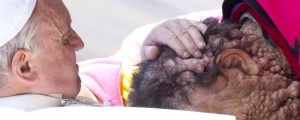 The Message of the Pope then also looks at the servants who are at the wedding feast of Cana, those people who fill the jars of water which Jesus than turns into wine. They are ‘unnamed people’, the Pope explains, but they ‘teach us a great deal’ because ‘they obey generously’ and ‘carry out immediately and well what they are asked to do, without complaining, without second thoughts’. This tells us that Christ ‘wants to rely upon human assistance’, a ‘readiness to serve those in need, and , in particular, our infirm brothers and sisters’. This can be a ‘tiring and burdensome’ service and yet the Lord transforms it ‘into something divine’ because ‘to be servants of others…more than anything else makes us like Jesus’. All us, therefore, can be ‘hands, arms and hearts which help God to perform his miracles, so often hidden’ and if we follow the example of Mary ‘Jesus will always change the water of our lives into the finest wine’.
The Message of the Pope then also looks at the servants who are at the wedding feast of Cana, those people who fill the jars of water which Jesus than turns into wine. They are ‘unnamed people’, the Pope explains, but they ‘teach us a great deal’ because ‘they obey generously’ and ‘carry out immediately and well what they are asked to do, without complaining, without second thoughts’. This tells us that Christ ‘wants to rely upon human assistance’, a ‘readiness to serve those in need, and , in particular, our infirm brothers and sisters’. This can be a ‘tiring and burdensome’ service and yet the Lord transforms it ‘into something divine’ because ‘to be servants of others…more than anything else makes us like Jesus’. All us, therefore, can be ‘hands, arms and hearts which help God to perform his miracles, so often hidden’ and if we follow the example of Mary ‘Jesus will always change the water of our lives into the finest wine’.
‘We are not witnesses to an ideology, a recipe, a way of doing theology, we are witnesses to the healing and merciful love of Jesus, not because we are better but because we are grateful witnesses to the mercy that transforms us’ (Pope Francis to religious, Santa Cruz – Bolivia).
Promoting the culture of encounter and peace in every hospital
When looking forward to the upcoming extraordinary Jubilee of Marcy and to the celebration of the World Day of the Sick in the Holy Land, and when referring to the two sisters of that land who were canonised last May – Saint Marie-Alphonsine Danil Ghattas and Saint Mary of Jesus Crucified Baouardy –, Pope Francis emphasised that ‘every hospital and nursing home can be a visible sign and setting in which to promote the culture of encounter and peace’, where the experience of illness, suffering, together with professional and fraternal help, ‘helps to overcome every limitation and division’. The Message ends with a prayer to Mary, asking her to direct her merciful eyes to God, ‘especially in times of pain’.
‘The pain is so great that to keep it in with words becomes unbearable. Pain does not have a face, it does not have a certain name, it is of no use and yet you see that pain is more tangible than so many faces, it is more secure than friends, it is more fertile than our works!…Allow it to leave open not only the door of memories but also the door of presence and hope…One has to suffer so that truth does not become crystallised into doctrine but is born from flesh. This evening I am aware that I am not defending a position’ (E. Mounier, Letters on Pain). At the same time, however, ‘one thing alone remains: to pray, so that the shadows do not become confused with the light’ (Ibidem).
MESSAGE OF THE HOLY FATHER FRANCIS FOR THE WORLD DAY OF THE SICK
February 2016)
TEXT IN ITALIAN AND IN ENGLISH
BRAZIL
 The Camillian Province of Brazil will celebrate with joy the ordination as a deacon of our religious brother Mauricio Gris. This will take place on 15 November 2015.
The Camillian Province of Brazil will celebrate with joy the ordination as a deacon of our religious brother Mauricio Gris. This will take place on 15 November 2015.
The fifteenth World Day of Pastoral Care in Health, with more than 1,400 participants, was celebrated at the St. Francis/St. Camillus Hospital on Thursday 29 October. The 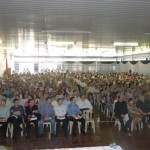 theme of the meeting was ‘Making our Lives like his History: ‘I came to serve’.
theme of the meeting was ‘Making our Lives like his History: ‘I came to serve’.
The principal goal of the event was the celebration of the eightieth anniversary of the arrival of Camillian religious in the western part of Santa Catarina (Iomerê) and of the thirty-one years of management of the Concórdia Hospital
Osmar Penso, the head of the Camillian hospitals of the south of Brazil, welcomed about 1,400 participants to the meeting.
The event was able to rely upon the presence of the Superior General of the Camillian Order, Fr. Leo Pessini, who offered a talk on the subject ‘Samaritan and Camillian Service in Pastoral Care in Health’. Msgr. Frei Mario Marquez, the Bishop of Joaçaba/Santa Catarina, was also present and he gave a talk on the subject of ecology and health, starting with the encyclical Laudato si’ of Pope Francis.
According to the coordinator of the event, Mrs Alice Gaio, the fifteenth Day of Pastoral Care in Health went beyond all expectations: people came from over thirty communes of Santa Catarina and the States of Paranà, Rio Grande do Sul and San Paolo. ‘If there is no evangelisation, no change is possible nor other possibilities of pursuing a correct and effective way approach in pastoral care in health’, she observed.
TAIWAN
 On 12-27 October 2015, Fr. Giuseppe Didoné organised and accompanied a group of thirty Catholic pilgrims on a pilgrimage to the Marian places of Fatima, Lourdes and Lisieux (the birthplace of St. Therese of Jesus and her parents Luigi and Zelia Martin, who have just been canonised) in order to strengthen their faith and learn about places that are dense in spirituality which they had only heard talked about by others.
On 12-27 October 2015, Fr. Giuseppe Didoné organised and accompanied a group of thirty Catholic pilgrims on a pilgrimage to the Marian places of Fatima, Lourdes and Lisieux (the birthplace of St. Therese of Jesus and her parents Luigi and Zelia Martin, who have just been canonised) in order to strengthen their faith and learn about places that are dense in spirituality which they had only heard talked about by others.
Our religious brother Fr. Marco Moioli was consecrated a priest on Saturday 7 November in his home parish of Rozzano (Milan) by Msgr. Pierantonio Tremolada, the Auxiliary Bishop of the diocese of Milan.
VERONA-SAN GIULIANO
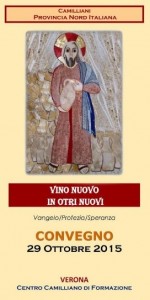 On Thursday 29 October 2015 the Camillian religious of the Province of North Italy came together at a conference in Verona at the Camillian Centre for Formation.
On Thursday 29 October 2015 the Camillian religious of the Province of North Italy came together at a conference in Verona at the Camillian Centre for Formation.
New wine in new wineskins: a conference on consecrated life
This meeting sought to respond to certain questions regarding the Community Project of the Province. During the year dedicated to consecrated life it was decided to bring together some suggestions concerning the ‘new’. The subject of the conference expressed the gospel metaphor that best expresses the urgent importance of, and the need for, the new. The sub-title, on the other hand, was the slogan that accompanies this year dedicated to consecrated life and are the realities by which we would like the need for the ‘new’ to be approached and vice versa: a new factor that bears the mark of the gospel, able to regenerate hope and express itself in prophecy.
All of this was analysed and filtered through our ‘colour’ and our special charismatic reality.
- To what extent and how can the ‘newness’ that we are asked to welcome be decisive and providential for our fraternity?
- What, in fact, are we asked to ‘renew’ and to ‘modify’?
- What is a our new wine?
- And what are the new experiences?
THE LAY CAMILLIAN FAMILY – the Province of North Italy
EDUCATING IN LIFE, EDUCATING IN HEALTH
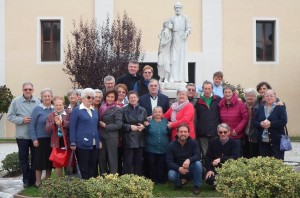 On 16-18 October, in the splendid setting of Villa Comello in Mottinello (VI), the members and supporters of the Lay Camillian Family (the group that is at Piossasco (Turin), the group of Milan, the group of Castellanza, the group of Verona and the group of Mestre) came together and dedicated themselves to extensive personal and community prayer. The meeting was opened and ended by two short papers given on behalf of the Provincial Council (Marisa Sfondrini, Piera Tua, Rosabianca Carpene amd Dianalori Palman). The central part of the meeting had two papers on the subject ‘Educating
On 16-18 October, in the splendid setting of Villa Comello in Mottinello (VI), the members and supporters of the Lay Camillian Family (the group that is at Piossasco (Turin), the group of Milan, the group of Castellanza, the group of Verona and the group of Mestre) came together and dedicated themselves to extensive personal and community prayer. The meeting was opened and ended by two short papers given on behalf of the Provincial Council (Marisa Sfondrini, Piera Tua, Rosabianca Carpene amd Dianalori Palman). The central part of the meeting had two papers on the subject ‘Educating
in Life’ (and thus on health, which the speaker would have preferred to entitle ‘Loving Life’), by Father Angelo Brusco. The following Sunday, in the morning, there was the long and analytical testimony of Brother Luca Perletti on the work carried out by the Camillian Task Force, the ‘assault group’ made up of Camillian religious which for many years – in obedience to the charism of the Founder – has worked in situations of especial gravity, as was recently the case with the disastrous earthquake in Nepal and in Sierra Leone with the devastating effect of the killer infection caused by the Ebola virus.
ROME – The Generalate House
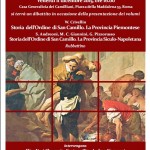 On Friday 11 December of this year at 16.00p, at our generalate house, there will be the launch of the two volumes published in the series of historical research on the oldest Camillian Provinces: Storia dell’Ordine di San Camillo. La Provincia Piemontese (‘A History of the Order of St. Camillus. The Province of Piedmont’) edited by W. Crivellin , and Storia dell’Ordine di San Camillo. La Provincia Siculo-Napoletana (‘A History of the Order of St. Camillus. The Province of Sicily and Naples’), edited by S. Andreoni, M. C. Giannini, and G. Pizzorusso.
On Friday 11 December of this year at 16.00p, at our generalate house, there will be the launch of the two volumes published in the series of historical research on the oldest Camillian Provinces: Storia dell’Ordine di San Camillo. La Provincia Piemontese (‘A History of the Order of St. Camillus. The Province of Piedmont’) edited by W. Crivellin , and Storia dell’Ordine di San Camillo. La Provincia Siculo-Napoletana (‘A History of the Order of St. Camillus. The Province of Sicily and Naples’), edited by S. Andreoni, M. C. Giannini, and G. Pizzorusso.
ROME – The Rectory Church of St. Mary Magdalene
On Saturday 31 October of this year – on the eve of the Solemnity of All Saints – from 21.00, in our fine Church of St. Mary Magdalene, we ‘celebrated’ HOLY-WEEN: songs, prayers, music, adoration of the Eucharist, the possibility of confession… The young ‘Sentries of the Morning’ and the Daughters of St. Camillus animated the evening from 21.00 to 23.30.
PHOTOGRAPHIC GALLERY
FEAST DAY OF MARY SALUS INFIRMORUM (16 November)
 13-14-15 November: TRIDUUM OF THOUGHT AND PRAYER
13-14-15 November: TRIDUUM OF THOUGHT AND PRAYER
16 November at 19.00: LITURGICAL CELEBRATION – Celebration of the Eucharist presided over by His Excellency MSGR. ZYGMUNT ZIMOWSKI (President of the Pontifical Council for Health Care Workers – for Health Pastoral Care)
 On Tuesday 8 December 2015 at 16.00, in the Church of St. Mary Magdalene, we will have the traditional but always keenly followed appointment of the Renewal of our religious vows. Our religious brothers in Rome, women Camillian religious and the supporters of our charism are invited to this moment of prayer and spirituality.
On Tuesday 8 December 2015 at 16.00, in the Church of St. Mary Magdalene, we will have the traditional but always keenly followed appointment of the Renewal of our religious vows. Our religious brothers in Rome, women Camillian religious and the supporters of our charism are invited to this moment of prayer and spirituality.
KENYA
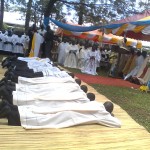 On Thursday 1 October 2015, four religious of the Delegation of Kenya were ordained deacons: William Augo Adhanja, Samuel Omollo Oleck, Kizito Mochere Omari and Justus Onsare Ombati.
On Thursday 1 October 2015, four religious of the Delegation of Kenya were ordained deacons: William Augo Adhanja, Samuel Omollo Oleck, Kizito Mochere Omari and Justus Onsare Ombati.
CHILE
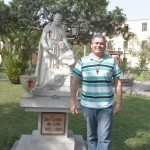 On Saturday 31 October, our religious brother Pablo Cerón Urrutia will be consecrated a priest by the Bishop of San Bernardo, Msgr. Iuan Ignacio Gonzàles.
On Saturday 31 October, our religious brother Pablo Cerón Urrutia will be consecrated a priest by the Bishop of San Bernardo, Msgr. Iuan Ignacio Gonzàles.
SANTIAGO, CHILE
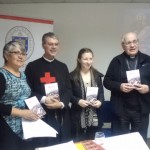 On 20 October at the Catholic Pontifical University and on 23 October at the Vicariate of the Bishops’ Conference of Santiago, the launch took place of the book Santos de la salud, tesoro y milagro de la Iglesia, a collection of 160 biographies (out of a total of 360) of saints/blesseds/men and women founders of Catholic health-care institutions. They are models of a healing Church that expresses the Gospel and the commandment of love. We thank for this publishing initiative Father Pietro Magliozzi. We also thank Dr. Rosa Walker and Msgr. Manuel Camilo Vial for their cooperation.
On 20 October at the Catholic Pontifical University and on 23 October at the Vicariate of the Bishops’ Conference of Santiago, the launch took place of the book Santos de la salud, tesoro y milagro de la Iglesia, a collection of 160 biographies (out of a total of 360) of saints/blesseds/men and women founders of Catholic health-care institutions. They are models of a healing Church that expresses the Gospel and the commandment of love. We thank for this publishing initiative Father Pietro Magliozzi. We also thank Dr. Rosa Walker and Msgr. Manuel Camilo Vial for their cooperation.
CENTRAL AFRICAN REPUBLIC
‘Only love can destroy the walls of hatred’.
 A new and interesting interview with our religious brother Fr. Bernard Kinvi has appeared on his involvement in aid and the promotion of peace in the conflict which has caused the shedding of blood in the Central African Republic, specifically shortly before the visit of Pope Francis to that country.
A new and interesting interview with our religious brother Fr. Bernard Kinvi has appeared on his involvement in aid and the promotion of peace in the conflict which has caused the shedding of blood in the Central African Republic, specifically shortly before the visit of Pope Francis to that country.
THE PROVINCE OF ROME
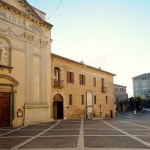 On 30 November to 3 December 2015, at the N. D’Onofrio Centre for Spirituality of Bucchianico (Ch) and within the framework of the Year of Consecrated Life, a spiritual meeting of analysis and exploration of religious life will be held. The animation is entrusted to Don Michele Masciarelli, a priest of the archdiocese of Chieti-Vasto and a lecturer in theology at the Theological Institute of Abruzzo and Molisano. ‘I expect that every form of consecrated life will ask itself about what God and humanity today ask for’ (Pope Francis, To All consecrated People).
On 30 November to 3 December 2015, at the N. D’Onofrio Centre for Spirituality of Bucchianico (Ch) and within the framework of the Year of Consecrated Life, a spiritual meeting of analysis and exploration of religious life will be held. The animation is entrusted to Don Michele Masciarelli, a priest of the archdiocese of Chieti-Vasto and a lecturer in theology at the Theological Institute of Abruzzo and Molisano. ‘I expect that every form of consecrated life will ask itself about what God and humanity today ask for’ (Pope Francis, To All consecrated People).
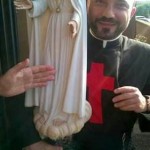 Our religious brother Antonio Zinni, on Saturday 28 November of this year, during the liturgy of the first vespers of the first Sunday of Advent, will be ordained a deacon at the church of the Camillian community of ‘Villa Sacra Famiglia’ in Rome.
Our religious brother Antonio Zinni, on Saturday 28 November of this year, during the liturgy of the first vespers of the first Sunday of Advent, will be ordained a deacon at the church of the Camillian community of ‘Villa Sacra Famiglia’ in Rome.
BURKINA FASO
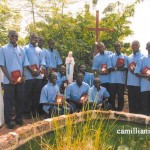 Beginning of the novitiate in Burkina Faso – Benin/Togo
Beginning of the novitiate in Burkina Faso – Benin/Togo
Camillian professed and novices of Burkina Faso/ Benin Togo: such a significant number of young religious fills us with joy, ‘This little plant will spread throughout the world…’.
Award of diplomas at the Camillianum Centre for Pastoral Care in Health of Ouagadogou- Burkina Faso
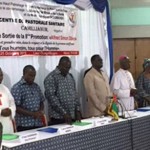 On Sunday 25 October in the presence of the President of the Republic of Burkina Faso, of the Minister for Health and of the Minister for Public Instruction and four bishops, amongst whom the Camilliann Msgr. Prosper Kontiebo, the Bishop of Tenkodogo, there took place the award of diplomas of the Camillianum Centre for Pastoral Care in Health of Ouagadougou.
On Sunday 25 October in the presence of the President of the Republic of Burkina Faso, of the Minister for Health and of the Minister for Public Instruction and four bishops, amongst whom the Camilliann Msgr. Prosper Kontiebo, the Bishop of Tenkodogo, there took place the award of diplomas of the Camillianum Centre for Pastoral Care in Health of Ouagadougou.
The President in this way wanted to express to the Camillian religious his esteem for the work they had engaged in during the first moments of the dramatic attempt at a coup d’état at the Hopital Saint Camille and in other health-care centres of the diocese.
The Camillianum, which is supported by the entire community of Burkino Faso, is entrusted, at the level of its management and animation, to Fr. Edgar Yameogo who took a degree on ‘The Theology of Pastoral Care in Health’ at the Camillianum of Rome.
CTF – THAILAND
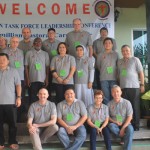 A meeting took place in Bangkok, as guests of the Camillian Provincial House, of the heads of the Camillian Task Force. With the coordination of the Consultor for Ministry, Fr. Aris Miranda, Camillian men religious, Camillian women religious and lay co-workers discussed and exchanged views about upcoming projects.
A meeting took place in Bangkok, as guests of the Camillian Provincial House, of the heads of the Camillian Task Force. With the coordination of the Consultor for Ministry, Fr. Aris Miranda, Camillian men religious, Camillian women religious and lay co-workers discussed and exchanged views about upcoming projects.
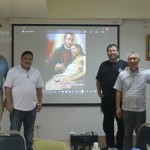 On 16-18 October, once again in Bangkok, the first meeting was held of the Secretariat for Ministry with all the animators responsible for the various geographical areas of the Camillian world.
On 16-18 October, once again in Bangkok, the first meeting was held of the Secretariat for Ministry with all the animators responsible for the various geographical areas of the Camillian world.
Minutes of the meeting – ITALIAN / ENGLISH
YEAR OF CONSECRATED LIFE – SPECIAL EVENT
The final great event of the Year of Consecrated Life will take place in Rome on 28 January 2016 – 2 February 2016 (click her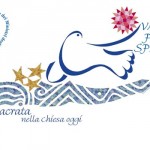 e for INFORMATION/ BOOKINGS).
e for INFORMATION/ BOOKINGS).
INDIA
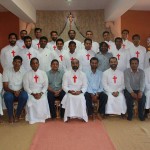 The Vice-Province of India, looking forward to its new status as a Province – which is envisaged for 2 February 2016 – celebrated its General Assembly on 22-25 October of this year, involving in its preparation and unfolding all our religious brothers and the various nuances of ministry and charism that are present in our Camillian communities of the region.
The Vice-Province of India, looking forward to its new status as a Province – which is envisaged for 2 February 2016 – celebrated its General Assembly on 22-25 October of this year, involving in its preparation and unfolding all our religious brothers and the various nuances of ministry and charism that are present in our Camillian communities of the region.
MESSAGGIO P. LEOCIR PESSINI – ENG
MESSAGE FR. VITTORIO PALEARI – ENG
PRESENTATION OF THE LIFE OF THE VICE-PROVINCE BY THE VICE-PROVINCIAL Fr. BABY ELLICKAL – ENG
ROME – THE PONTIFICAL COUNCIL FOR HEALTH CARE WORKERS (FOR HEALTH PASTORAL CARE)
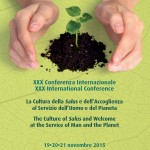 On 19-2 November the XXX international conference of the Pontifical Council for Health Care Workers (for Health Pastoral Care) will be held. Its title will be ‘The Culture of Salus and Welcome at the Service of Man and the Planet’.
On 19-2 November the XXX international conference of the Pontifical Council for Health Care Workers (for Health Pastoral Care) will be held. Its title will be ‘The Culture of Salus and Welcome at the Service of Man and the Planet’.
Download here the complete programme ITALIAN AND ENGLISH
Download here the enrolment form. ITALIAN AND ENGLISH
ROME – CAMILLIANUM

L’intervento della Prof.ssa Palma Sgreccia, docente aggiunto di Filosofia morale durante la Mostra-Dibattito “Il lato oscuro della scienza”
The talk by Prof. Palma Sgreccia, adjunct lecturer in moral philosophy, during the exhibition-debate ‘The Dark Side of Science’.
We are happy to announce that by a protocol dated 28 August 2015 of the Congregation for Catholic Education and by a protocol of 26 September 2015 of the Pontifical Lateran University, Cardinal Agostino Vallini, the Vicar General of His Holiness for the city of Rome and the Grand Chancellor of the Pontifical Lateran University, has appointed Prof. PALMA SGRECCIA dean of the ‘Camillianum’ International Institute of Pastoral Theology of Rome for the years 2015-2018.
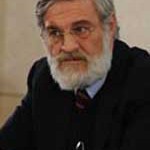 To her go our best wishes for a fruitful academic tenure and to Prof. Massimo Petrini go our most cordial and sincere thanks for his work, his professionalism and his friendship during these years of cooperation with this academic institute and the Order of St. Camillus.
To her go our best wishes for a fruitful academic tenure and to Prof. Massimo Petrini go our most cordial and sincere thanks for his work, his professionalism and his friendship during these years of cooperation with this academic institute and the Order of St. Camillus.
The ORDER OF STUDIES 2015/2016 of the Camillianum has been published. It can be downloaded here
INAUGURATION of the academic year 2015/2016 of the Camillianum.
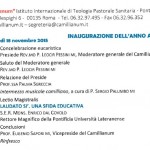 Wednesday 18 November 2015, at 9.30.
Wednesday 18 November 2015, at 9.30.
The Superior General Fr. Leocir Pessini, the Dean Prof. Palma Sgreccia and the Vice-Dean Prof. Eugenio Sapori will also be present.
CONFERENCE: The alliance between the generations in an ageing society. A project of the Camillian community
Friday 4 December 2015
Presentation
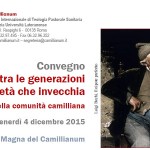 The fall in births and the rapid development of biomedical knowledge and technology have brought about a steady and significant ageing of the population, creating new life expectancy rates.
The fall in births and the rapid development of biomedical knowledge and technology have brought about a steady and significant ageing of the population, creating new life expectancy rates.
Elderly people certainly do not possess the same physical resources as young people but their contribution is not for this reason less fertile. One may think of the value of continuity with the past and of their experience of life within the context of a society folded in on the present and heavily fragmented, as is the case with our society. This conference, organised by the Camillianum and by
General Secretariat for Ministry of the Order of St. Camillus, seeks to offer a valid model of alliance between the generations, a response to the so-called throwaway and exclusion culture (Evangelii gaudium, n. 43).
During the first session of deliberations, an analysis will be engaged in, with theological, philosophical and ethical contributions, of the coordinates of the art of ageing in a Christian approach. During the second session, the analysis will centre around the Letter of the Superior General of the Camillians entitled ‘To Our Elderly and Sick Religious Brothers’, which is based upon the value of sharing and non-marginalisation, an invitation to live with dignity and elegance a stage of life ‘not only of memories but also of dreams’, our Sunday of life.
AGENDA OF THE SUPERIOR GENERAL AND THE GENERAL CONSULTA
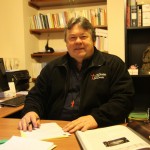 From 24 October until 1 November, Fr. Leocir Pessini will be in the south of Brazil to take part in the celebrations to commemorate the eightieth anniversary of the arrival of the Camillians in the south of Brazil, in Iomerê, in the Paróquia São Luigi Gonzaga, a small town that now has about 3,000 inhabitants. He will then leave for his visit to our Camillian religious brothers in Indonesia and Australia with Fr. Aris.
From 24 October until 1 November, Fr. Leocir Pessini will be in the south of Brazil to take part in the celebrations to commemorate the eightieth anniversary of the arrival of the Camillians in the south of Brazil, in Iomerê, in the Paróquia São Luigi Gonzaga, a small town that now has about 3,000 inhabitants. He will then leave for his visit to our Camillian religious brothers in Indonesia and Australia with Fr. Aris.
On 5-11 November Fr. Leocir, together with the member of the General Consulta Fr. Aris Miranda, will visit the Camillian community of Flores-Maumere in Indonesia. They will then visit our religious brothers of Australia on 12-17 November.
On 18 November Fr. Leocir will take part in the inauguration of the academic year 2015/2016 of the Camillianum (Rome).
On 25- 27 November, Fr. Leocir will take part at Rome in the sixth-monthly meeting of the Union of Major Superiors.
In Rome (the generalate house), on 3-5 December, he will take part in the third meeting of the Central Economic Commission of the Order.
Fr. Leocir Pessini in ITALY
- On 20-22 November he will meet our religious brothers of Forte dei Marmi, Genoa and Imperia.
- On 28-29 November he will be in Predappio (FC) to visit the Camillian community and the people cared for at that place.
- On 4- 6 December he will be in Pavia, Como and Besana Brianza.
- On 10-12 December he will visit the Camillians who live and work in Florence.
- On Sunday 13 December he will celebrate the Eucharist at the Parish of St. Camillus in Rome.
From 28 November to 7 December, the member of the General Consulta Fr. Aris Miranda will be in Sierra Leone to supervise the development of the project of the Camillian Task Force relating to the emergency of the Ebola virus.
Laurent Zoungrana, on 6-7 November 2015, will take part in the meeting of the Charismatic Families, an event sponsored by the Union of General Superiors in Rome. The theme of the event will be ‘Charismatic Families in Dialogue during the Year of Consecrated Life’.
Br. Ignacio Santaolalla, during the beginning of the month of November, will visit the Camillian community and the ‘Saint Camillus’ Campus of Milwaukee (U.S.A.).
DECISIONS OF THE GENERAL CONSULTA
 Presentation and approval of the general framework of the most important meetings of the Order during the current six-year period 2016/2020. Events and meetings are envisaged which seek to strengthen dialogue, planning and assessment as regards the Camillian Project at an international level; to foster dialogue between religious; and to establish in a technical sense dates that will already allow the organisation of the diaries of everyone.
Presentation and approval of the general framework of the most important meetings of the Order during the current six-year period 2016/2020. Events and meetings are envisaged which seek to strengthen dialogue, planning and assessment as regards the Camillian Project at an international level; to foster dialogue between religious; and to establish in a technical sense dates that will already allow the organisation of the diaries of everyone.
Read the presentation of the General Consulta ITALIAN – ENGLISH
Approval of the request of Fr. Gervasio d’Alessio (the Province of Piedmont, now the Province of North Italy) for the granting of the dispensation to leave the Order and to be placed in the diocese of Benevento. The documents have been sent to the relevant Vatican dicastery.
Approval of the request of Fr. Scott Francis Binet (the Province of Brazil – the Delegation of North America) of an extra-claustra dispensation for three years. During this period he will be welcomed by the ordinary bishop of the diocese of Madison (USA).
Fr. Leocir Pessini, given the specific request advanced by the Extraordinary General Chapter (Arricia–June 2014) to recreate the Central Economic Commission, with the agreement of the General Consulta has appointed as members of this commission for the six-year period of 2014-2020 the following:
Fr. Mario Louis KOZIK (the Province of Brazil);
Dott. Emilio Servando VILLAR PERNAS (who works with the Province of Spain).
Thanking them for their generous readiness to help, we hope that they will work successfully for an increasing ‘vigilance and transparency in dealing with economic-financial matters’.
DECEASED RELIGIOUS
‘See, now they vanish, the faces and places, with the self which, as it could, loved them. To become renewed, transfigured, in another pattern’ (T.S. Eliot)
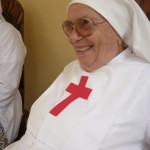 The women religious of the Daughters of St. Camillus have communicated the news of the death of their dear sister, Sr. Giovina Pellegrini (aged 78, of which 56 were spent as a professed religious), which took place on 15 October 2015 (on the eve of the feast day of the Blessed Giuseppina Vannini). The Lord wanted beside him our sister of the mission of Burkina Faso, her second homeland!
The women religious of the Daughters of St. Camillus have communicated the news of the death of their dear sister, Sr. Giovina Pellegrini (aged 78, of which 56 were spent as a professed religious), which took place on 15 October 2015 (on the eve of the feast day of the Blessed Giuseppina Vannini). The Lord wanted beside him our sister of the mission of Burkina Faso, her second homeland!
LETTER TO SISTER GIOVINA – from the BLOG ‘With the Heart of a Mother’
Saturday 31 October 2015, at the Camillian community of “St. Camillus Health Care Center” di Milwaukee (U.S.A), the death took place of Fr. William F. Cronin (age of 66).
‘Now they live in Christ whom they met in the Church, followed in our vocation, and served in the sick and the suffering. Trusting that the Lord, the Holy Virgin our Queen, St. Camillus, the Blessed Luigi Tezza and the Blessed Giuseppina Vannini, and our deceased religious brothers and sisters, will welcome them in their midst, we commend them in our prayers, remembering them with affection, esteem and gratitude’.
 Saturday 31 October 2015, at the Camillian community of “St. Camillus Health Care Center” di Milwaukee (U.S.A), the death took place of Fr. William F. Cronin (age of 66).
Saturday 31 October 2015, at the Camillian community of “St. Camillus Health Care Center” di Milwaukee (U.S.A), the death took place of Fr. William F. Cronin (age of 66).
THE HOLY YEAR OF MERCY– OPENING 8 DECEMBER 2015
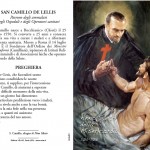 ‘We cannot escape the Lord’s words to us, and they will serve as the criteria upon which we will be judged: whether we have fed the hungry and given drink to the thirsty, welcomed the stranger and clothed the naked, or spent time with the sick and those in prison (cf. Mt 25:31-45). Moreover, we will be asked if we have helped others to escape the doubt that causes them to fall into despair and which is often a source of loneliness; if we have helped to overcome the ignorance in which millions of people live, especially children deprived of the necessary means to free them from the bonds of poverty; if we have been close to the lonely and afflicted; if we have forgiven those who have offended us and have rejected all forms of anger and hate that lead to violence; if we have had the kind of patience God shows, who is so patient with us; and if we have commended our brothers and sisters to the Lord in prayer. In each of these “little ones,” Christ himself is present. His flesh becomes visible in the flesh of the tortured, the crushed, the scourged, the malnourished, and the exiled … to be acknowledged, touched, and cared for by us. Let us not forget the words of Saint John of the Cross: “as we prepare to leave this life, we will be judged on the basis of love”
‘We cannot escape the Lord’s words to us, and they will serve as the criteria upon which we will be judged: whether we have fed the hungry and given drink to the thirsty, welcomed the stranger and clothed the naked, or spent time with the sick and those in prison (cf. Mt 25:31-45). Moreover, we will be asked if we have helped others to escape the doubt that causes them to fall into despair and which is often a source of loneliness; if we have helped to overcome the ignorance in which millions of people live, especially children deprived of the necessary means to free them from the bonds of poverty; if we have been close to the lonely and afflicted; if we have forgiven those who have offended us and have rejected all forms of anger and hate that lead to violence; if we have had the kind of patience God shows, who is so patient with us; and if we have commended our brothers and sisters to the Lord in prayer. In each of these “little ones,” Christ himself is present. His flesh becomes visible in the flesh of the tortured, the crushed, the scourged, the malnourished, and the exiled … to be acknowledged, touched, and cared for by us. Let us not forget the words of Saint John of the Cross: “as we prepare to leave this life, we will be judged on the basis of love”
(Pope Francis, Bull of Indiction Misericordiae Vultus, n. 15)
PRAYER OF THE JUBILEE IN DIFFERENT LANGUAGES



